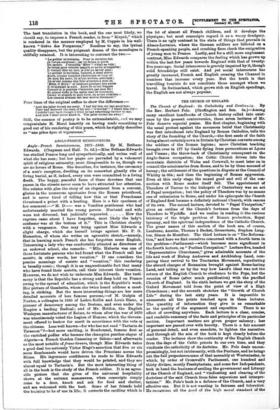ANGLO-FRENCH REMINISCENCES.
Anglo - French Reminiscences, 1875 -1899. By M. Betbam- Edwards. (Chapman and Hall. 7s. 6d.)—Miss Betham-Edwards has studied France long and sympathetically, and writes well of what she has seen ; but her pages are pervaded by a vehement spirit of religious animosity, most disagreeable to us, though we are no lovers of Rome. She describes, for instance, the ceremony of a nun's reception, dwelling on its somewhat ghastly rite of living burial, as if, indeed, every nun were committed to a living death. The happy, peaceful faces of these devotees that one passes in the streets never seem to have attracted her attention. She relates with glee the story of an elopement from a convent, glories in the numerous apostasies from the Roman priesthood, and is never tired of telling how this or that Frenchman threatened a priest with a beating. Here is a fair specimen of her comment :—" M. D— was a Vendetin gentleman who had unfortunately married the wrong person. Husband and wife were not divorced, but judicially separated How the rupture came about I have forgotten, most likely the lady's confessor was at the bottom of it." This is Christian charity with a vengeance. One may bring against Miss Edwards a slight charge, which she herself brings against Mr. P. G. Hamerton, of whom she writes an agreeable sketch,—namely, that in learning much French she has forgotten some English. concerning a lady who was comfortably situated as directress of an endowed school, she remarks : " Mlle. Huberte was one of those fortunate persons who had found what the French call her assiette, in other words, her vocation." If one considers the precise meanings of assiette and " vocation," this rendering is broadly comic ; though it is an unquestionable fact that many who have found their assiette, call their interest their vocation. However, we do not wish to -inderrate Miss Edwards. Her testi- mony is that the Republic has a strong and deep hold on France owing to the spread of education, which is the Republic's work. Her picture of Gambetta, whom she twice heard address a meet- ing, is striking. But the more interesting things are her more detailed accounts of less famous persons,—of M. Guepin of antes, a colleague in 1830 of Ledru-Rollin and Louis Blanc, a pioneer of democracy among the Bretons, and even under the Empire a leading Radical ; and of Mr. Holden, the English Wesleyan manufacturer of Reims, to whom after the war of 1870 was unanimously voted the Legion of Honour, which the Govern- ment offered to bestow for merit in accordance with the vote of the citizens. Less well known—for who has not read " Tartarin de Tarascon"2—but more exciting, is Bombonnel, famous first as the enriched pedlar who became the champion panther-slayer of Algeria—a French Gordon Cumming or Selous—and afterwards as the most notable of franc-tireurs, though Miss Edwards takes a good deal too seriously Victor Hugo's assertion that five or six Inure Bombonnels would have driven the Prussians across the Rhine. His ingenuous confidences he made to Miss Edwards with full knowledge that they would be printed, and they are almost equal to Tartarin's. But the most interesting thing of all in the book is the study of the French soldier. It is an agree- able picture that she gives of the universal hospitality shown at the autumn manmuvres, when conscripts simply come to a door, knock and ask for food and shelter, and are welcomed with the best. Some of her friends hold the training to be of use in life; it corrects the spoiling which is the lot of almost all French children, and it develops the physique ; but most conscripts regard it as a weary drudgery. There is an ugly contrast in the state of things that prevails in Alsace-Lorraine, where the German soldiers are billeted on a French-speaking people, and crushing fines check the emigration of young men to France. Lastly, and for a still more unpleasant contrast, Miss Edwards compares the feeling which has grown up within the last few years towards England with that of twenty- five years ago. Social intercourse is gravely impaired by it, though solid friendships still exist. And yet social intercourse has greatly increased, French and English crossing the Channel in numbers that increase every year. But the truth is that travelling tourists do not conciliate those amongst whom we travel. In Switzerland, which grows rich on English spendings, the English are not always popular.


















































 Previous page
Previous page